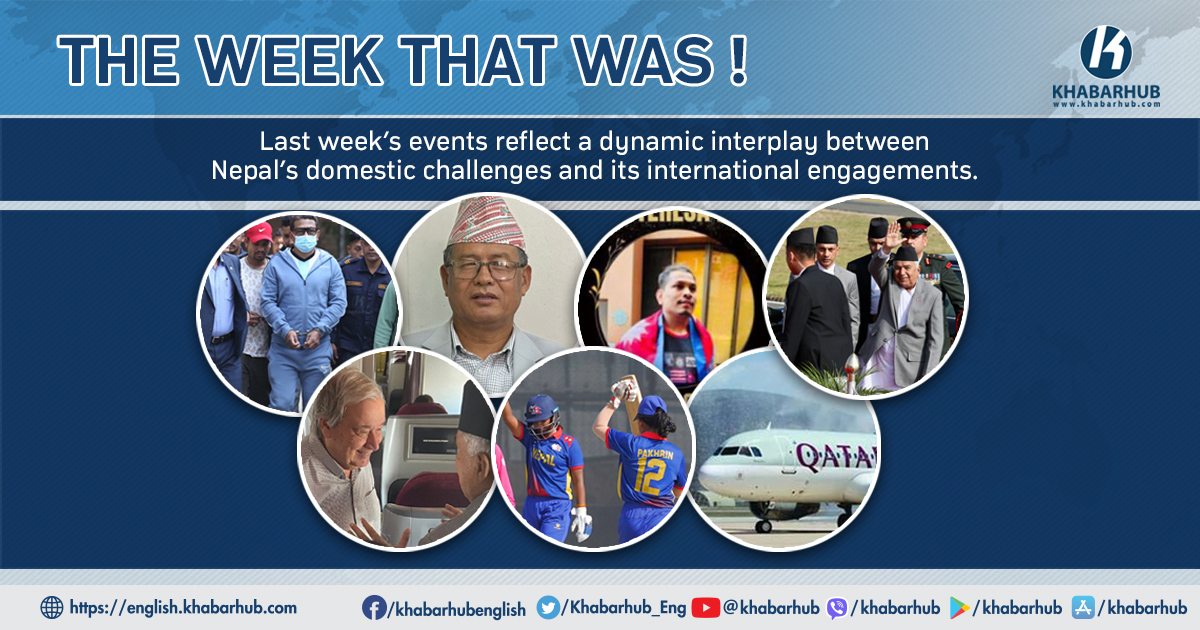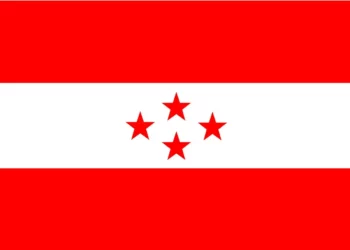KATHMANDU: The past week in Nepal was marked by significant national and international developments, ranging from diplomatic engagements on global issues like climate change to domestic political and legal events. Here’s an analytical breakdown of the key events:
Nepal officially started exporting electricity to Bangladesh under a tripartite agreement signed with India and Bangladesh on October 3.
Beginning on November 10, Nepal will export 40 megawatts of electricity annually from June 15 to November 15, generating an estimated revenue of approximately 92 million US dollars over five months.
The electricity, sourced from the Trishuli and Chilime hydropower projects, will be transmitted via the Dhalkebar-Muzaffarpur and Behrampur-Bhedamara transmission lines.
This deal, finalized after six years of preparation, marks a significant milestone in Nepal’s energy exports, with Nepal earning in U.S. dollars for the first time.
However, technical losses between Dhalkebar and Muzaffarpur will be borne by the Nepal Electricity Authority (NEA), and the export will be regulated based on meter readings from Muzaffarpur.
This initiative not only boosts Nepal’s energy revenue but also strengthens regional energy cooperation in South Asia.
President Ram Chandra Paudel’s participation in the 29th Conference of the Parties (COP29) to the United Nations Framework Convention on Climate Change (UNFCCC) underscores Nepal’s ongoing commitment to the global climate change dialogue.
His engagement in Baku, Azerbaijan, with world leaders and climate stakeholders reinforces the urgency of the climate crisis, especially for developing countries like Nepal, which are disproportionately impacted despite their minimal carbon emissions.
Paudel’s remarks about pushing developed nations to fulfill their climate finance commitments highlight the critical issue of climate justice.
Developing nations continue to suffer from severe weather events, rising temperatures, and natural disasters, yet their capacity to address these impacts remains limited.
Paudel’s assertion that developed countries must take responsibility for reducing emissions and fulfilling their financial pledges is consistent with Nepal’s broader climate advocacy on the international stage.
The meeting with Azerbaijan’s Minister of Justice, Farid Turab Ahmadov, serves as a reminder that climate change is a global concern that transcends national borders.
Ahmadov’s mention of Azerbaijan’s drying water sources due to melting snow mirrors the challenges faced by Nepal in its mountainous regions. This strengthens the narrative of shared vulnerability to climate change, reinforcing the need for cooperative, transnational action.
The brief interaction between President Paudel and UN Secretary General António Guterres aboard the aircraft symbolizes the urgency with which global leaders are approaching climate change.
It also highlights the common thread of global collaboration and the need for collective action, something that Nepal continues to stress at international platforms.
Preparation intensifies for December 1 Local By-Elections
The establishment of 38 election offices signifies a crucial step in the electoral process for the upcoming local-level by-elections on December 1.
With 32 offices designated for chief election officers and six for election officers, the Election Commission is laying a solid groundwork for efficient electoral administration.
The timeline outlined for electoral activities, including the candidacy filing and finalization of candidates’ lists, highlights the commission’s commitment to a transparent and orderly election process.
By ensuring that voting will take place from 7:00 AM to 5:00 PM, the EC aims to facilitate maximum participation from the electorate, underscoring the importance of these local elections in shaping governance at the community level.
Deepak Manange’s Arrest: The arrest of former Gandaki Province Minister Deepak Manange, a prominent figure convicted for attempted murder, marks a significant legal development.
The Supreme Court’s decision to uphold the verdict and sentence him to prison illustrates Nepal’s commitment to holding individuals accountable for criminal activity, regardless of political stature.
Manange’s case is a reminder of the ongoing struggles within Nepal’s political landscape, where politicians often find themselves embroiled in legal controversies.
The arrest also signals the judicial system’s increasing focus on impartiality in handling high-profile criminal cases, though concerns about political influence in such cases remain prevalent.
Rabi Lamichhane’s Interrogation: The interrogation of Rabi Lamichhane, the Chair of the Rastriya Swatantra Party, over alleged fund misappropriation at a cooperative is yet another example of how Nepal’s political landscape is increasingly marked by legal scrutiny.
Lamichhane, who rose to political prominence with a platform of transparency and accountability, now finds himself at the center of a controversy over financial mismanagement in the cooperative sector.
His denial of the charges, alongside his party’s populist rhetoric, puts him in a precarious position, as he faces scrutiny not only for potential criminal activity but also for the political implications of such allegations.
The increasing number of such cases involving prominent politicians highlights a broader issue of financial transparency and corruption in Nepal.
The questioning of figures like Lamichhane and Dhanraj Gurung, a Nepali Congress Vice-President linked to embezzlement at Miteri Cooperative, is indicative of the growing demand for accountability within Nepal’s political and financial institutions.
Dinesh Sunar’s International Award: Dinesh Sunar’s recognition with the International Mother Teresa Award is a rare moment of celebration for Nepal on the global stage.
Sunar’s achievements as a world record-holding parkour athlete, along with his contributions to social welfare, highlight the potential of Nepali youth to make a positive impact on both the global sports community and local society.
The fact that he is the first Nepali to receive this prestigious award speaks to his exceptional dedication, which will likely inspire other young Nepali athletes and social activists to follow suit.
Nepal’s U-19 Women’s Cricket Team Qualification: Nepal’s qualification for the U-19 Women’s T20 World Cup in Malaysia is another source of national pride.
The team’s remarkable victory over the UAE, securing a spot in the tournament, signifies growth and success for women’s sports in Nepal.
The increasing visibility of female athletes in cricket and other sports offers a valuable opportunity for challenging gender norms and empowering women and girls in Nepal to pursue careers in sports.
Qatar Airways and Aviation Expansion: The launch of Qatar Airways commercial flights from Gautam Buddha International Airport (GBIA) marks a significant milestone in Nepal’s aviation sector.
The addition of an international airline route connecting Bhairahawa with Doha, and onward to Kathmandu, represents a step towards improving Nepal’s connectivity with the rest of the world.
This development is expected to bolster Nepal’s tourism and economic ties with the Middle East, facilitating the movement of goods, people, and services between the two regions.
It also suggests a growing recognition of the importance of regional airports in enhancing Nepal’s international presence and global connectivity.
Energy Sector Developments: The public release of the Lal Commission report on the Nepal Electricity Authority (NEA) tariff dispute highlights ongoing concerns within Nepal’s energy sector.
The government’s decision to address tariff collections and reconnections for industries is crucial for the economic recovery of businesses affected by power cuts and inconsistent electricity supply.
It remains to be seen how the government will balance the needs of industrial consumers with the broader goals of energy sustainability and affordability for ordinary citizens.
Conclusion
Last week’s events reflect a dynamic interplay between Nepal’s domestic challenges and its international engagements.
While President Paudel’s participation in COP29 reinforces Nepal’s advocacy on climate change, domestic issues like political corruption, the arrest of figures like Deepak Manange, and Lamichhane’s legal troubles suggest a turbulent political environment.
On a positive note, achievements in sports and expanding international connectivity, such as the Qatar Airways launch and Nepal’s qualification for the U-19 Women’s T20 World Cup, provide a welcome contrast to the more contentious developments.
Together, these events illustrate Nepal’s ongoing journey towards political reform, economic development, and international prominence amidst a rapidly changing global landscape.









Comment